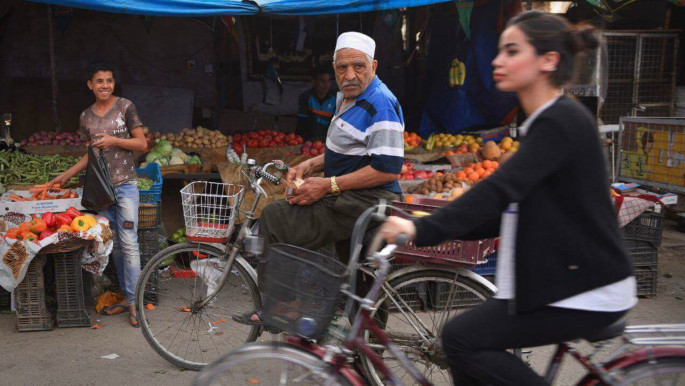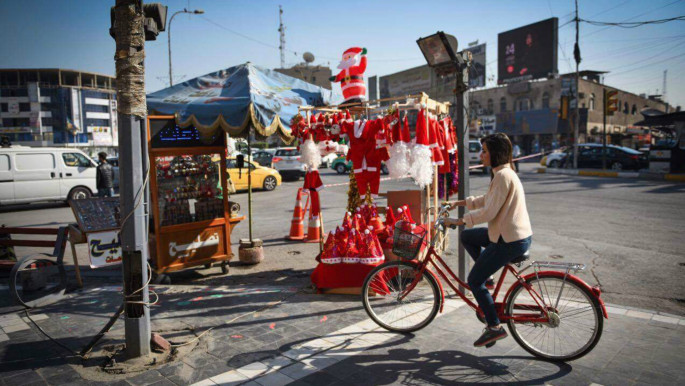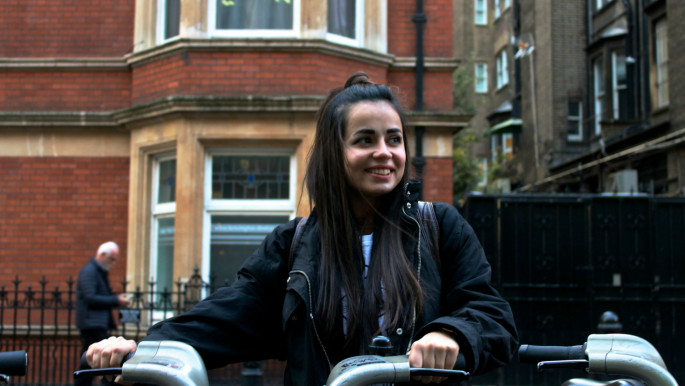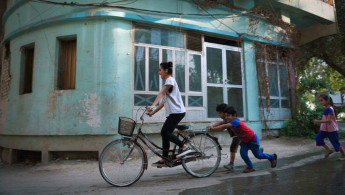Iraqi artist challenges Baghdad's streets and collective-trauma by bike
"I was pretty nervous the first few times, I could hear my heart beat. Only guys ride bikes in Baghdad. There were moments some people expressed objection. I got some strange stares," says Jaber, rather seriously, before breaking into a broad smile.
"But most people were fine with it, at the start they just stare because they are unfamiliar with this sight, it is something you don't really see anymore."
Beginning in January last year Jaber took to the streets of many of Baghdad's historically rich neighbourhoods including Shouwaka, Moutanabi, Midan, and Shorja photographing her experiences in the process.
An exhibition displaying her work was put on in the Iraqi capital in April 2016.
Positive reaction to the initiative — which garnered a considerable social media buzz, both in Iraq and elsewhere in the Arab world — inspired Jaber to turn what had been planned strictly as an art project into a civil initiative encouraging fellow Baghdadis, particularly women, but also men, to similarly take to the streets on two wheels.
Since November, Jaber has organised a number of joint bike rides with members of the public invited to attend. Turn out has not been enormous, between 50 and 100 people took part in the last ride in December, says Jaber.
However, signs are encouraging and plans are afoot to continue the initiative this year.
"I don"t have plans to stop," says Jaber earnestly. "Hopefully we can get more people to participate."
 |
| The sight of a young woman riding a bicycle in Baghdad these days has become uncommon [Marina Jaber] |
At a time when Iraqi forces are battling Islamic State militants for control of the northern city of Mosul backed by a US-led international coalition of states, promoting civil initiatives such as Jaber's may not be at the top of everyone in the country's agenda.
Baghdad itself has witnessed a spate of deadly bomb attacks in recent months that have claimed the lives of civilians at bustling town squares, fruit and vegetable markets, and travelling in mini buses, simply going about their daily business.
But Jaber argues on the contrary that due to such realities it is important for Iraqis to fight back and provide a different picture of society to that witnessed in media headlines, not principally for the outside world, but for themselves, to reconnect with past traditions that have fallen by the wayside after years of instability.
"People have looked at the security situation in the country, the war in Mosul, and some said that it isn"t the right time. But in a way I am fighting against Daesh, this sort of extreme mentality," says Jaber, a little defiantly, recalling family tales of eras passed in Baghdad, a city originally founded in the 8th century.
 |
People have looked at the security situation in the country, the war in Mosul, and some said that it isn’t the right time. But in a way I am fighting against Daesh, this sort of extreme mentality. |  |
"In the 70s my mum, and grandmother used to ride bikes. It was fine."
Jaber explains that she struck on the idea underlying her art project during a trip to London over Christmas 2015 with her British-Iraqi husband Hussein, and in particular during an encounter with a "Boris bike" in Hyde park that inspired mixed emotions. At that time, says Jaber, she had not ridden a bike since her childhood.
"I thought maybe I'd forgotten how to ride and when I got on and I could do it I initially felt proud. Then this made me feel uncomfortable, I didn't like the feeling because it had been so long.
"I thought I will do this in my country … there are these things in Iraqi society that are not socially accepted but they are not forbidden, they are not illegal. So I took the bike to try and find out."
 |
| Jaber on her trusty red bicycle in the Mansour district of Baghdad [Marina Jaber] |
Jaber argues that years of state-sponsored repression under Saddam Hussein — during which Iraq was placed under international sanctions for its role in the Gulf War — and consequent fractures in Iraqi society brought about by the Baath regime's toppling during the 2003 US-led invasion of the country, had created a collective trauma in Iraqi society at large.
This has only been further accentuated by IS' emergence in the country in 2014.
"As a society sometimes I think we stopped thinking about the little things we care about, that often bring us the most joy," says Jaber frowning quizically.
"There was one occasion when I was riding and I felt nervous, and there was a young boy riding too. I asked him to stay close and he replied, 'Why? You are not Cinderella. You are just a girl on a bike.'
"It made me laugh and feel determined. I used to blame society for a lot of things that I couldn't do. But then I realised that I am this society. If we can't ride bikes, how can we ask young girls to demand to be treated equally?"
 |
Once when I was riding and I felt nervous there was a young boy riding too. I asked him to stay close and he replied 'Why? You are not Cinderella. You are just a girl on a bike.' |  |
During the 1950s Iraqi women were pioneers in the Arab world in forcing through the enactment of personal status laws enabling them to work in professions such as medicine, engineering and law from which they had been previously banned.
These changes also saw jurisdiction over personal status law pass from old shari'a courts to government run- courts that improved women’s rights in matters including divorce, child custody, and inheritance, and saw all judged according to one law regardless of religious/sectarian affiliation.
To this day still considered one of the most progressive in the Middle East region in recent years the Iraqi personal status law has been routinely opposed by religious leaders in the country who have campaigned for jurisdiction to return to religious courts, and rallied against the codification of personal status law to cover all sectarian communities in the country.
"We need to push other women to stand up, and challenge, to break boundaries," says Jaber, who remains quick to point out that men's participation in her bike rides is also encouraged.
"I was originally surprised by the interest, but I have had a lot of people contact me since I started the project to say that they have been inspired to pursue things that they always wanted to do.
 |
| Jaber struck upon the idea that led to her initiative riding a "Boris bike" during a trip to London in winter 2015 [Martin Armstrong] |
"There is even a girl near Mosul who sent me a picture of her riding her bike."
Jaber admits that not all reactions to her initiative have been positive.
"There was one time a man tried to grab my bike wheel to stop me. That was a bit scary," recalls Jaber.
"But there was also a time I was riding towards an army checkpoint and a soldier was putting out barbed wire to close the road. I was nervous and was ready to turn around and go a different way. But he saw me, and pulled back the barbed wire to let me pass.
"People are much nastier on social media."
In addition to garnering public support Jaber has also attracted the backing of members of the Iraqi press, artistic community, and even Baghdad's security forces.
"The head of all of security in Baghdad came to one of the rides and expressed support," says Jaber, in a spasm of excitement, before shooting off at another tangent, all energy.
"I can't remember his name, he was very kind. Other times when I've been riding people have stopped and expressed joy, saying 'thank you, this is the Baghdad we remember, and know and love,'" she continues, glancing beyond the window panes of the cafe where a fleet of not particularly aero-dynamic Boris bikes sit curb-side.
"I prefer my bike," she says, tongue-in-cheek, heading out the cafe for a closer look.
"I am excited to continue riding this year."
Follow Martin Armstrong on Twitter: @MKLArmstrong





 Follow the Middle East's top stories in English at The New Arab on Google News
Follow the Middle East's top stories in English at The New Arab on Google News


